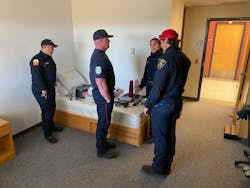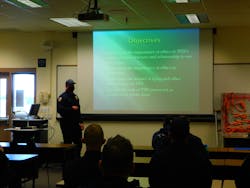More than two decades have passed since I graduated from the fire academy, eager to begin my firefighting career at one of the busiest engine companies in the western United States. Unsurprisingly, each shift had its own personality and, in some cases, its own microculture.
I landed on a very experienced, laid-back crew. The captain was high up on the chief’s promotional list. The engineer was in the testing process for captain. Although my probationary (“boot”) year had its share of good-natured teasing about my lack of culinary prowess and lousy sense of direction, it was filled with quality mentoring and was the model of professionalism as far as everyone who I encountered.
One of my classmates ended up on a shift that had a reputation of hard work and hard play—an aggressive, fun-loving, highly competent group of members who loved what they did. They also liked giving their boot firefighters a difficult time that sometimes went a bit too far. I recall the “good-natured” fun of them duct-taping their boot to a long spine board and hoisting him up the hose tower. My former classmate took this in stride and found it hilarious, but the potential for disaster is easy to see, from the delay in response time, to lawsuits for emotional trauma, to potential claims of assault.
How did we get here?
Fast forward a few years and several settled lawsuits later and we were left wondering, how did we get here?
The Tucson, AZ, Fire Department (TFD) underwent large turnover, coupled with unprecedented growth, which resulted in many of its senior firefighters having no more than three years of experience. Many captains had 5–7 years on the job, which left many companies without the strong mentorship that often only comes with more years of experience than that.
Also to be considered is one of sociologist Diane Vaughan’s theories in her normalization of deviance principle: Over time, clearly unsafe practices, without negative outcomes, come to be considered normal behavior, that is until the inevitable catastrophe occurs.
At play, too, is the psychological phenomenon that’s known as affective recall bias, which is the tendency to retrospectively overestimate negative affective experiences. In other words, we might recall the treatment that we received during our probationary year as being worse than it actually was. When we then go to pass on our affective experiences to those who we are tasked to mentor, the affective experience might take on a more negative outcome. (The phenomenon can skew toward the positive, too.)
Regardless of exactly what brought the Tucson Fire Department to this crossroads, a cultural adjustment needed to be made. A multilayered approach was taken by which issues at various levels of the organization—recruit training, quarterly departmental continuing education, and captain/battalion chief academy/certification and promotional testing—were addressed.
Recruit training
Although training at the department still very much adheres to a paramilitary structure, the way that training officers talk to recruits and the way that recruits are treated were adjusted.
Adherence to protocols and to strictly enforced policy and discipline are part of the fire service, and the department wholeheartedly believes in these principles. However, everything that the TFD does in recruit training should have a purpose and a sound reason, other than “that’s how we’ve always done it.”
Being direct—and often painfully honest—with a recruit regarding the individual’s performance help to prepare that person for the dangerous, life-threatening profession that person selected. On the fireground, there isn’t time for niceties or soft skills; it’s time for action, direction and following the orders of command. It’s about recovering from mistakes quickly and seamlessly, without hanging one’s head, because that’s what’s required to get the job done.
That said, it’s impossible to justify belittlement, threats and insults. There’s no place in today’s fire service for mistreatment of members. Furthermore, it’s the responsibility of veterans and officers to exhibit the behavior that the department seeks to develop in newer members and recruits. At the end of the TFD’s 22-week academy, the department wants its new firefighters to talk about how challenging the program was but also about how much the staff genuinely cared about them and wanted them to succeed. Laying the groundwork of mutual respect in the academy carries forward to new members’ treatment of others, both inside and outside of the organization, throughout their career.Continuing education
Many of us attended continuing education sessions that obviously were designed to address specific issues that hit our department. However, by committing to engaging in difficult topics on a regular basis and via a more proactive, rather than reactive, approach, we hopefully avoid the normalization of deviance that we all experienced at one point or another in our fire service career.
Many large corporations include ethics as part of their organizational continuing education, typically on an annual or biennial basis. A variety of topics can be included during these interactive sessions.
The TFD engaged its most respected and experienced captains and chiefs from the field. It discovered more often than not that the seasoned officers had a good understanding of their role and of what crossed the line from playful banter or constructive criticism to inappropriate behavior and hazing. Newer officers who had fewer than five years in the captain’s seat often struggled with this distinction.
Continuing education sessions often took an organic turn into a mentoring session: The seasoned officers group guided the direction of the conversations and led the charge by making it clear to all others that the job of the company officer is to create a safe and healthy working environment for every person who is a member of the crew.
Captain/chief certification
The third piece to the puzzle was for the TFD to make a concerted effort to ensure that company officers and battalion chiefs were well-educated in regard to their responsibility to prevent hazing and any other mistreatment of members of the department.
Tucson’s Office of Equal Opportunity Programs, the human resources department and the city’s legal department all have important roles in educating future leaders regarding the risks of failure in this area of their responsibility. Recruit training and continuing education are ways by which we address challenges internally, but bringing in “outsiders” provides a completely different perspective.
Case studies that are presented in class detail the circumstances that led to catastrophic results for firefighters’ mental health and to disciplinary action. The latter included criminal charges for the front-line supervisors who were responsible for the firefighters’ well-being and high-priced settlements paid by communities.
Future leaders must be educated on how to recognize the early warning signs of hazing behavior. The courage and responsibility to act must be instilled in them.
Incorporating role-play scenarios into the testing processes for the captain and chief officer provides the TFD with an opportunity to assess the effectiveness in the department’s developmental programs.
Furthermore, through the testing process, the department identifies the necessary adjustments that are required of its programmatic processes. Constant evaluation of training programs by the department is necessary for it to remain nimble and adaptive to the needs of the ever-changing workforce.
Safe culture
A certain degree of teasing, pranking and even horseplay can serve as inclusionary social aspects of the profession. We must instill in our people the ability to differentiate what is healthy team-building and camaraderie and what’s destructive hazing and harassing behavior.
Open and honest discussion about what’s acceptable and what isn’t, from recruit training through promotional processes, helps to create the safe and mentoring culture that we profess to embrace and that we promise to the communities that we serve.
About the Author
Lewis Harris
Lewis Harris is a 23-year veteran of the Tucson, AZ, Fire Department, where he has worked as a firefighter, paramedic, captain, training officer, technical rescue team captain, battalion chief and the deputy chief of the training division. He now serves as the assistant fire chief of the department's administrative and personnel services bureau. Harris is an adjunct instructor for Pima Community College and holds a bachelor's degree in business administration from the University of Arizona.

